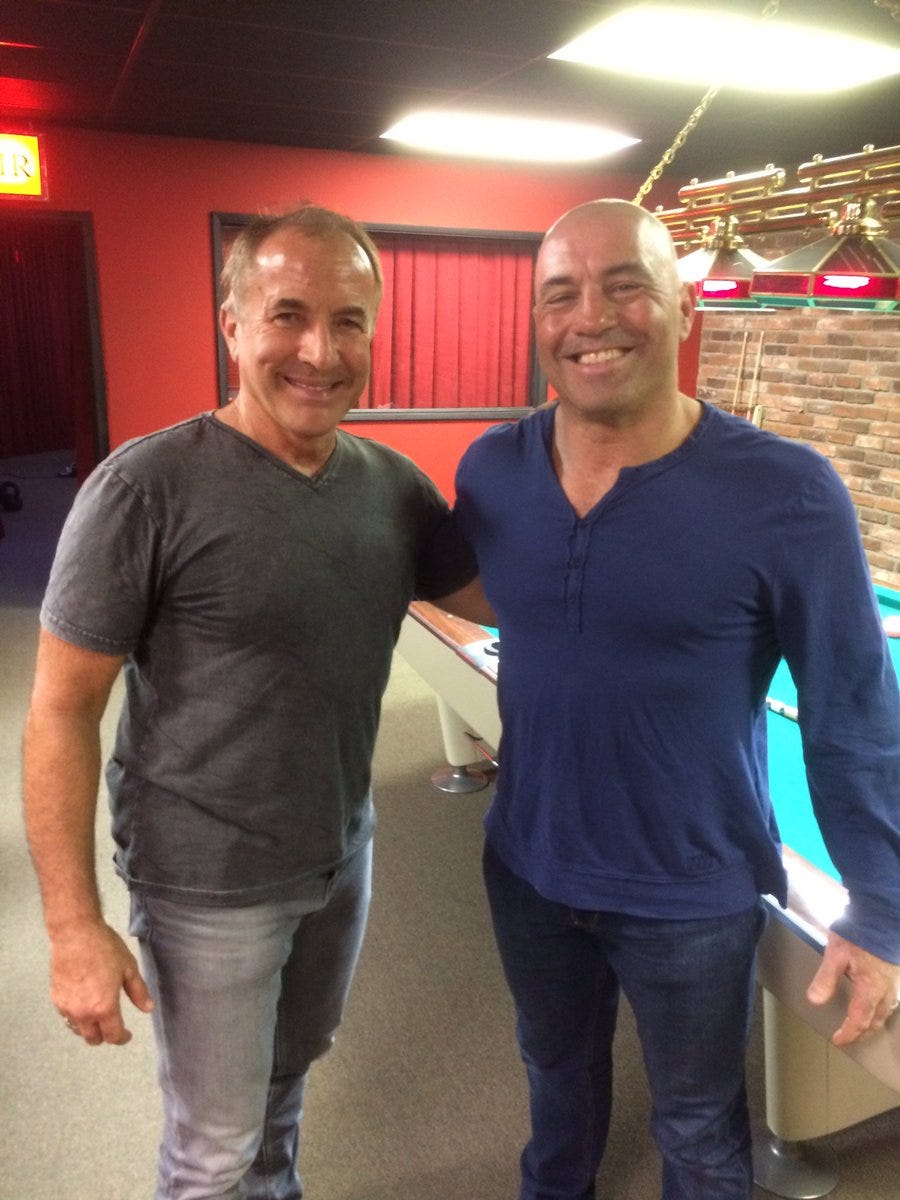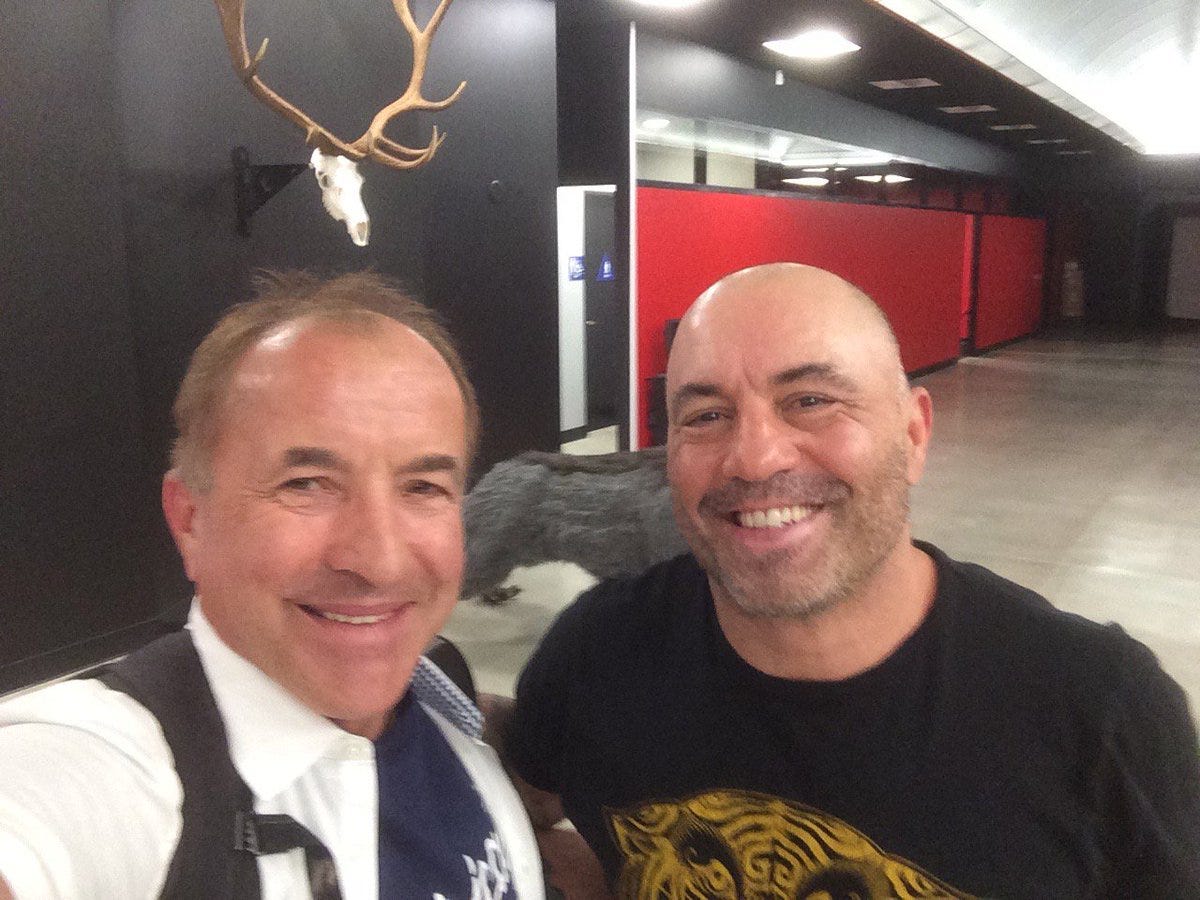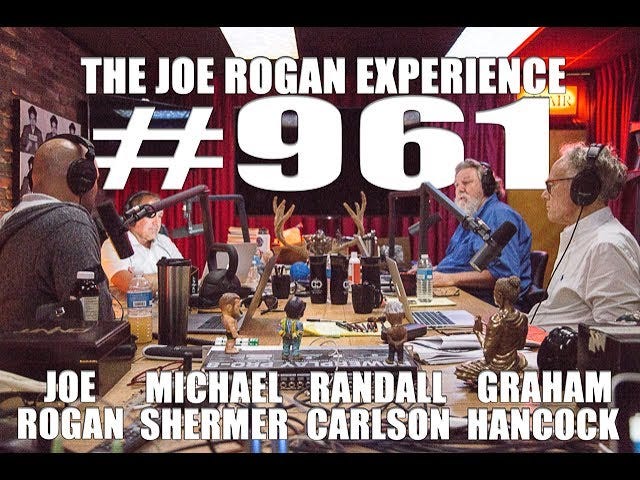The Joe Rogan Effect
Why censorious responses to controversial claims is not the road to a free society
There’s a scene in Howard Stern’s autobiographical film Private Parts where his NBC radio show handlers are at once stunned and baffled by the sudden ratings’ spike the shock jock was experiencing after a series of outlandish in-studio pranks, like an attractive woman stripping naked as Howard provides on-air commentary that precedes this dialogue between a network executive (Peter Maloney) and Kenny, AKA Pig Vomit (Stern’s sobriquet for his despised producer, played by Paul Giamatti):
Executive : The average radio listener listens for eighteen minutes. The average Howard Stern fan listens for - are you ready for this? - an hour and twenty minutes.
Pig Vomit : How can that be?
Executive : Answer most commonly given? "I want to see what he'll say next."
Pig Vomit : Okay, fine. But what about the people who hate Stern?
Executive : Good point. The average Stern hater listens for two and a half hours a day.
Pig Vomit : But... if they hate him, why do they listen?
Executive: Most common answer? "I want to see what he'll say next."
This exchange may perhaps offer some insight into the recent brouhaha over The Joe Rogan Experience podcast carried by Spotify, the latest turn of which has the legendary singer-songwriter Joni Mitchell joining the equally storied Neil Young in pressuring Spotify to remove Rogan’s show from the platform or else…take down their music. “Irresponsible people are spreading lies that are costing people their lives,” explained Mitchell on her website Friday. “I stand in solidarity with Neil Young and the global scientific and medical communities on this issue.”
In response to Young’s ultimatum Spotify promptly removed his songs from their platform, and will likely do the same with Mitchell’s music. The company says it has policies in place to remove misleading content from its platform, claiming to have purged more than 20,000 podcast episodes related to COVID-19. Will they eventually cave and cancel Rogan as more artists come out against the podcast? Let’s hope not.
To be clear, this is not a First Amendment free speech issue. The government has nothing to say in the matter. Spotify can do what it wants, and aging rockers can protest by withdrawing their products if they want. But is such censorious protesting productive? No. Why?
It’s another form of the bigotry of low expectations: the content consuming public is so dumb, so gullible, so irrational that they are unable to think critically about important issues, so we will do it for them. Why should some team of censors (or computer algorithms) dictate what I can and cannot consume? I’ll do my own thinking, thank you.
Such protests add oxygen to the fire: Rogan has a huge audience, but the Associated Press, the BBC, NBC, ABC, CBS, PBS, and all the other MSM outlets do not normally cover episodes of The Joe Rogan Experience unless they become newsworthy. So millions of downloads are now tens of millions or more.
Forbidden fruit: a natural response many people have to being told that they can’t have something is to want it even more. It’s the oldest story in the Bible, which I recounted in The Moral Arc this way, in asking why a jealous and vengeful God named Yahweh decided to punish women for all eternity with the often intolerable pain of childbirth, and further condemned them to be little more than beasts of burden and sex slaves for the victorious warlords: “It was all for that one terrible sin, the first crime ever recorded in the history of humanity—a thought crime no less—when that audacious autodidact Eve dared to educate herself by partaking of the fruit of the tree of the knowledge of good and evil. Worse she inveigled the first man—the unsuspecting Adam—to join her in choosing knowledge over ignorance.”
Censorship fuels fringe claims: I’ve devoted a career to studying fringe groups and marginalized beliefs, and I can tell you that they thrive on censorship—literally: membership rolls expand and donations swell whenever their peripheral claims are censored, because “they” don’t want you to know what we’ve discovered.
I’ve known Joe Rogan for many years and appeared on his show five times (for example, here, here, here, here, and here). Unlike most talk-show hosts I have engaged with over the decades, a dialogue with Joe Rogan is like talking to an old friend, and he allows the conversation to advance organically without an agenda. He’s an exceptional conversationalist who is extremely high in trait openness, that is, he’s willing to consider almost any and all claims his guests push across the table. It’s not his job to filter ideas for his listeners. There’s no editing—the show is recorded and posted as is. Most of what people object to in his shows are things his guests say, not what he says. He’ll talk to almost anyone about almost anything. I agree with him on many topics, and disagree with him on many other topics, which is exactly what you’d expect about someone who talks for three to four hours a day, four to five days a week, often about interesting and important topics. If anyone agreed with Rogan about everything that would make him a cult leader, which he most certainly is not.
The recent Rogan controversy calls up more general reasons why we should be extremely cautious in censoring people for their alleged heretical views, which I outlined in Giving the Devil His Due:
Who decides which speech and thought is acceptable and which is unacceptable? You? Me? The majority? A thought committee? The language police? The control of speech is how dictatorships and autocracies rule. We must resist the urge to control what other people say and think.
What criteria are used to censor certain speech? Ideas that I disagree with? Thoughts that differ from your thoughts? Anything that the majority determines is unacceptable? This is another form of tyranny, a tyranny of the majority.
It is not just the right of the speaker to speak but for listeners to listen. When colleges deplatform speakers or students succeed in silencing a speaker through the heckler’s veto, the right of the audience to hear the speaker’s ideas are violated.
We might be completely right but still learn something new in hearing what someone else has to say.
We might be partially right and partially wrong, and by listening to other viewpoints we might stand corrected and refine and improve our beliefs.
We might be completely wrong, so hearing criticism or counterpoint gives us the opportunity to change our minds and improve our thinking. No one is infallible. The only way to find out if you’ve gone off the rails is to get feedback on your beliefs, opinions, and even your facts. Alternative Facts are corrected by Confirmed Facts, but the confirmation bias means we are all subject to seeking only confirming evidence for our beliefs. To overcome it we must listen to our critics.
Whether right or wrong, by listening to the opinions of others we have the opportunity to develop stronger arguments and build better facts for our positions. If you know only your own position you do not know it as well as you would if you knew your opponent’s position.
Freedom of inquiry—a form of free thought and speech—is the bases for all human progress because of human fallibility. We are all wrong some of the time (and many of us most of the time) so the only way to know if you’ve gone off the rails is to tell others about your beliefs so that they may be tested in the marketplace of ideas. In science this is called conjecture and refutation, or hypothesis testing.
My freedom to speak and dissent is inextricably tied to your freedom to speak and dissent. If I censor you, why shouldn’t you censor me? If you silence me, why shouldn’t I silence you? Once customs and laws are in place to silence someone on one topic, what’s to stop people from silencing anyone on any topic that deviates from the accepted canon?
So let’s all chill out about this latest media paroxysm and think for ourselves, and if you don’t like what Joe Rogan, his guests, or anyone else says about anything, explain why you think they’re wrong, what exactly you object to, why you think your opinion is better than their opinion, and especially if there are factual errors then point them out (there are now near-limitless platforms to get your voice heard). That is the essence of a free society. Let’s all work to keep it free.





I agree with your general point. Censorship is not the answer. I think aging rockers, though, can ask for their own music not to be associated with an outlet they think actively promotes falsehoods, though. Up to them. If I have a product and some unsavory group wants to make money by selling it, I'm within bounds to say "no thanks."
All your points are true, especially about forbidden fruit. But the fringe liars are going to complain about censorship either way. It's all part of the vast government conspiracy against them. Unless Robert Malone is embraced by the CDC and FDA and President Biden, and given a platform to spout his false and misleading and emotionally manipulative information, he's going to drone on about how he's being censored and persecuted. Blah blah blah.
And yet we still have a problem, when people like Malone are given free rein to spout un-fact-checked claims, and someone as influential and credulous as Rogan promotes him. Rogan is sharp and asks good questions, but he doesn't have the scientific background to understand or check up on the answers. So he's basically at this hustler's mercy. And then so is his audience of bazillions, most of whom also don't have the scientific background to understand or fact-check his claims.
I tried to respond in my own newsletter to the recent Rogan episode with Malone, and I found just how true Brandolini’s Law is: “The amount of energy needed to refute bullshit is an order of magnitude larger than is needed to produce it.” After 7000 words, I'd barely scratched the surface of what was misleading and untrue. I wore out.
And then of course his fans say "what about this this and this." It's like a football field full of dandelions. You'll never get them all.
Corporate censorship is not illegal. But it should be. We live in a republic. We can give ourselves these rights.
Cigarettes cannot be advertised. Food companies have to list ingredients. Private companies have to make cakes for weddings that are against their religion.
So let's make it illegal for Google, Twitter, Facebook to be arbitrars of what is authoritative and what is misinformation... Spotify has a good policy on this that is clear and without judgement or reliance on captured government agencies.